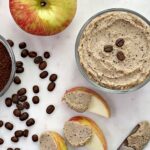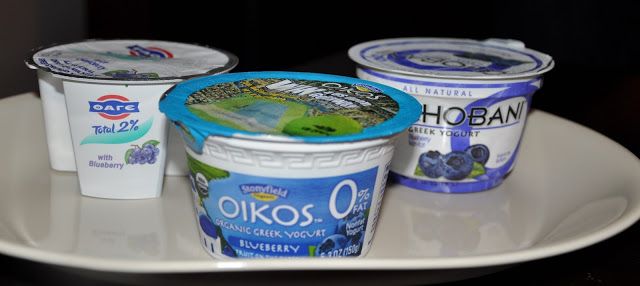
Greek yogurt is an amazing food that not only promotes health, but also contains “good” bacteria that can help regulate digestion and boost immunity. It is packed with key nutrients like protein, calcium, potassium, iodine, and B vitamins. Greek yogurt is also a great choice for people who are lactose intolerant because it contains live and active cultures that help digest lactose.
The difference between Greek yogurt and regular yogurt, is that Greek yogurt is made by straining off the liquid whey, which concentrates the protein in the yogurt. Much of the lactose is removed in the process, leaving behind casein, the primary milk protein, and the fat content. The result is a thicker, higher-protein yogurt.
Greek yogurt tends to be more expensive because it requires up to 3 times as much milk to make compared to regular yogurt. To be “competitive”, some brands cut costs by adding thickeners (think: gelatin, corn starch, milk protein concentrate), often labeling their yogurts as “Greek style”. Real Greek yogurt will not contain these thickening agents; it will also have a high protein content that is 2 to 3 times higher than traditional yogurts.
Your Guide to Choosing a Healthy Greek Yogurt
The yogurt case at the grocery store can be very overwhelming with many different options for brands and flavors. While Greek yogurt can be nutritious and tasty, not every yogurt is a healthy choice. Some commercially prepared yogurts have as much fat and sugar as desserts.
I created a Greek Yogurt Comparison Chart to help me decode food labels and ingredient lists. Click here for your FREE download!
The following guidelines will help with locate a healthy yogurt to meet your nutritional needs. One 6-ounce portion of yogurt should contain:
- Less than 150 calories
- Less than 4 grams of fat *
- Less than 20 grams of sugar if flavored
- At least 13 grams of protein
- At least 20% of your daily value (DV) of calcium
- No rBGH (growth hormones)
- No additives like sweeteners, fillers, thickeners, preservatives, or artificial colors
* The healthiest choice will be a non-fat or low-fat Greek yogurt. A 6-ounce portion of yogurt made with whole milk will contain 7-9 grams of fat; a low -fat yogurt contains 2-4 grams, and a non-fat variety has 0 grams fat.
Below you will find a list of added ingredients that are commonly found in yogurt.
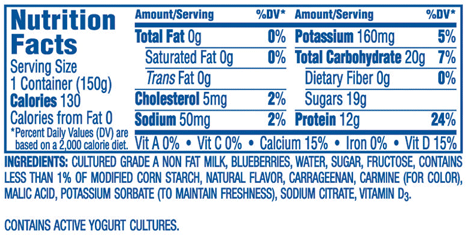 Sweeteners:
Sweeteners:
The “sugars” on the Nutrition Facts panel include both naturally-occurring and added sugars. On average, 6-ounces of plain Greek yogurt contains about 7 grams of naturally-occurring sugar. This is the sugar found naturally in milk (lactose), not added sugar. Flavored Greek yogurts should contain no more than 20 grams of sugar, as listed on the nutrition label. Every additional 4 grams of sugar means 1 teaspoon of added sugar. If you find Greek yogurt with more than 20 grams of sugar, in a 6-ounce portion, consider it to be a dessert rather than a dairy serving, since it has more than 3 teaspoons of added sugar.
It is important to read the Nutrition Facts panel. Added sugar can be disguised under many different names, such as:
- Fructose
- Sugar
- High fructose corn syrup
- Evaporated cane juice * (aka sugar)
- Simple syrup
- Honey
- Fruit juice / fruit juice concentrate
Artificial Sweeteners are common in “diet” yogurts and “sugar free” or “no sugar added” varieties. These yogurts will contain added ingredients such as acesulfame potassium (Aspartame), sucralose (Splenda), and neotame.
* The only difference between evaporated cane juice and white sugar is that evaporated cane juice has some traces of molasses, which gives it a darker caramel color.
Thickeners & Fillers
Modified cornstarch can be used as a thickener, stabilizer, or emulsifier. In yogurt it is often used for texture to improve the creaminess.
Other common thickeners or fillers (which means less real yogurt) include maltodextrin, pectin, locust bean gum, guar gum, carob bean gum, xanthan gum, and gelatin.
Preservatives:
Potassium sorbate is the most widely used food preservative in the world. In yogurt it is used to inhibit molds, yeasts, and select bacteria.
Citric acid is an organic acid that exists in citrus fruits and is a natural preservative and flavor additive.
Flavor:
Sodium citrate, made from the natural fruit acid citric acid, balances the acidity of yogurt to enhance its flavor.
Malic acid is a natural compound that is used as a food additive to give foods and candies a tart flavor.
Coloring Agents:
Ideally the coloring of yogurt should come from the natural fruit added; however, coloring agents are usually added to create a more desirable product. Some added coloring agents include turmeric, fruit and vegetable juice concentrate, annatto extract, carmine, and carrageenan.
Carmine is an all-natural additive made from pulverized bodies of cochineal insects to create red dye. According to the Food and Agriculture Organization, it takes 40,000 bugs to produce one pound of cochineal extract. Cochineals are harvested, sun-dried, crushed and dunked in an acidic alcohol solution to produce carminic acid, which the red color comes from.
Carrageenan, a seaweed-derived ingredient is used to create a better texture, or “mouthfeel”. Researchers have reliably proven that dietary doses of carrageenan can lead to harmful inflammation.
Eat Well with Gina’s Greek Yogurt Rankings
Top 5 Plain Greek Yogurts
(Based on a 6oz serving size)
All are gluten free and contain 20% calcium unless otherwise noted
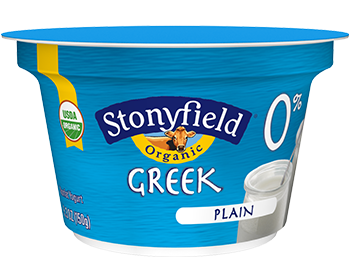 1. Stonyfield Organic Greek (organic)
1. Stonyfield Organic Greek (organic)
2. Dannon Oikos (“gluten safe, 15% calcium)
3. Chobani
4. Fage 0% (pronounced fah-yeh)
5. Voskos Organic (organic)
Stonyfield Organic and Dannon Oikos provide 90.5kcals, 0g fat, 7g sugar, and 17g protein
Chobani and Fage 0% contain 100kcals, 0g fat, 7g sugar, and 18g protein
Voskos Organic contains 102kcals, 0g fat, 5.6g sugar, and 17g protein
Fage Total Classic and Fage Total 2% plain Greek yogurt did not make my “Top 5” list because they are high in calorie and contain saturated fat.
The following brands did not contain a Plain Flavor option:
Yoplait Greek 100
Dannon Activia Greek
Dannon Light & Fit Greek
Muller Greek Corner
Top 5 Flavored Greek Yogurts
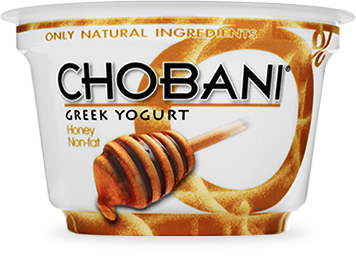
(Based on a 6oz serving size)
All are gluten free and contain 20% calcium unless otherwise noted
1. Chobani Honey (130kcal, 0g fat, 16g sugar, 14g protein) — sweetened with clover honey and is gluten free
2. Fage 0% (120kcal, 0g fat, 16-17g sugar, 13g protein) — sweetened with cane sugar, in addition to the fruit, and contains corn starch and xanthan gum
3. Chobani, Fruited (130-170kcal, 0-4.5g fat, 17-21g sugar, 13-14g protein)— In addition to the fruit, it is sweetened with evaporated cane juice and contains locust bean gum and pectin
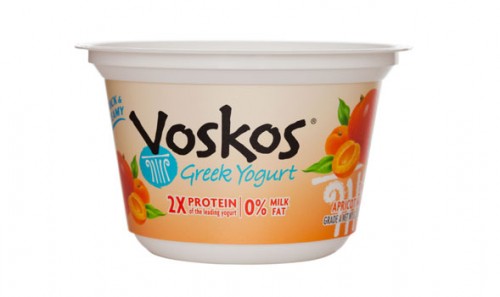
4. Yoplait Greek 100 (113kcal, 0g fat, 8-10g sugar, 11-15g protein) — Contains added sugar, artificial sweeteners (sucralose and acesulfame potassium), and cornstarch
5. Voskos (136-147kcal, 0g fat, 15-19g sugar, 13.5-15g protein)—Sweetened with evaporated cane juice, thickened with corn starch and tapioca starch, and contains citric acid and fruit juice concentrate
I love that Stonyfield Greek flavored yogurts are organic; however, they did not make my “Top 5” list because they contains carrageenan and are high in sugar. Yoplait Greek flavored yogurts are no on the list because they are high calories, sugar, and are low in calcium. Finally, Fage Total Classic and Fage Total 2% flavored Greek yogurts did not make the cut because they are high in calories, total fat, and sugar, contain saturated fat and are low in calcium.
Bottom 5 Greek Yogurts
(Based on actual serving size)
All are gluten free and contain 20% calcium unless otherwise noted
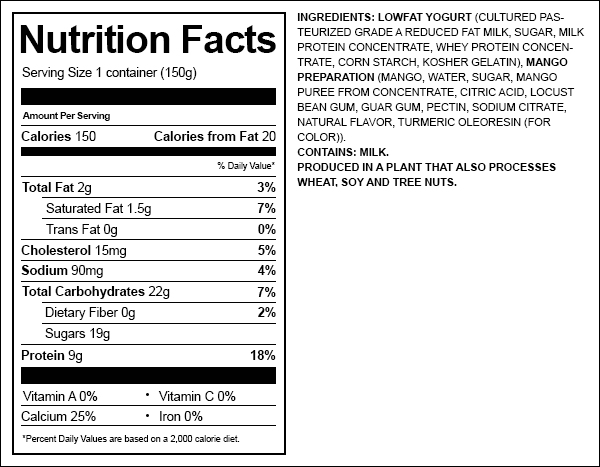 1. Muller Greek Corners are an example of a “Greek style” yogurt. Milk protein concentrate and whey protein concentrate are added to add extra protein to make it high in protein like real Greek yogurt. Muller also contains a lot of additives. Additives include sweeteners (added sugar and glucose syrup), fillers (corn starch, gelatin, locust bean gum, guar gum, pectin), and artificial coloring (carmine). In a 5.3oz serving size Muller Green Corners contain 140-220kcals, 2-9g fat, 17-21g fat, and 7-13g protein meaning it does not only contain a lot of additives, but is also high in calories, contains saturated fat, and is high in sugar.
1. Muller Greek Corners are an example of a “Greek style” yogurt. Milk protein concentrate and whey protein concentrate are added to add extra protein to make it high in protein like real Greek yogurt. Muller also contains a lot of additives. Additives include sweeteners (added sugar and glucose syrup), fillers (corn starch, gelatin, locust bean gum, guar gum, pectin), and artificial coloring (carmine). In a 5.3oz serving size Muller Green Corners contain 140-220kcals, 2-9g fat, 17-21g fat, and 7-13g protein meaning it does not only contain a lot of additives, but is also high in calories, contains saturated fat, and is high in sugar.
2. Dannon Greek yogurts win the award for most additives. They are high in sugar, low in calcium, are considered gluten free and are colored using carmine and carrageenan. Additives include fillers, preservatives, flavor enhancers, sweeteners, and added coloring. Sweeteners include sugar, fructose, sucralose, and acesulfame potassium. Coloring agents include evegetable juice concentrate, carrageenan, carmine, annatto extract, and black carrot juice.
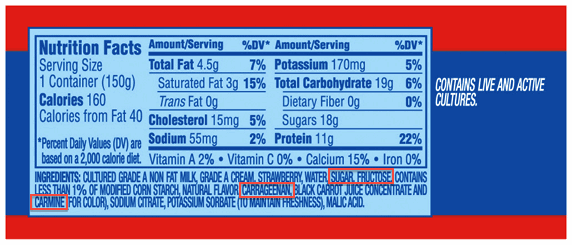
3. Yo Crunch’s Greek yogurt with Post® Honey Bunches of Oats Granola Clusters, available in vanilla and strawberry yogurt, contain added sugar and fillers. The Post® Honey Bunches of Oats Granola Clusters adds even more added sugar and additives like brown sugar, corn syrup, sugar, high oleic vegetable oil, honey, and caramel color.
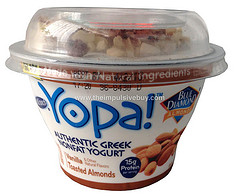
4. Yo Crunch Yopa! Authenic Greek yogurt are packaged with mix in toppings that add calories, fat, and sugar. The toasted almonds adds 90 calories and 8 grams fat, the toasted coconut topping adds 70 calories, 6 grams fat, and 5 grams sugar, and then crunch 9 whole grain granola adds 80 calories, 2 grams fat, and 5 grams sugar.
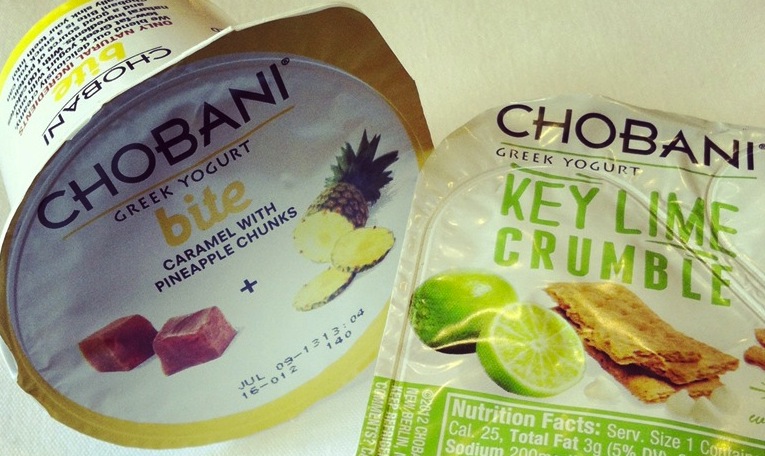
5. Chobani Flips and Bites are more of a dessert. They are high in calories, fat and sugar. They also contain additives such as sugar, cane sugar, evaporated cane juice, caramelized sugar syrup, milk fat, salt, thickeners and fillers.
Greek yogurt is a great choice, but read your food labels to make sure you aren’t eating a dessert in disguise that is colored with pulverized bugs!




